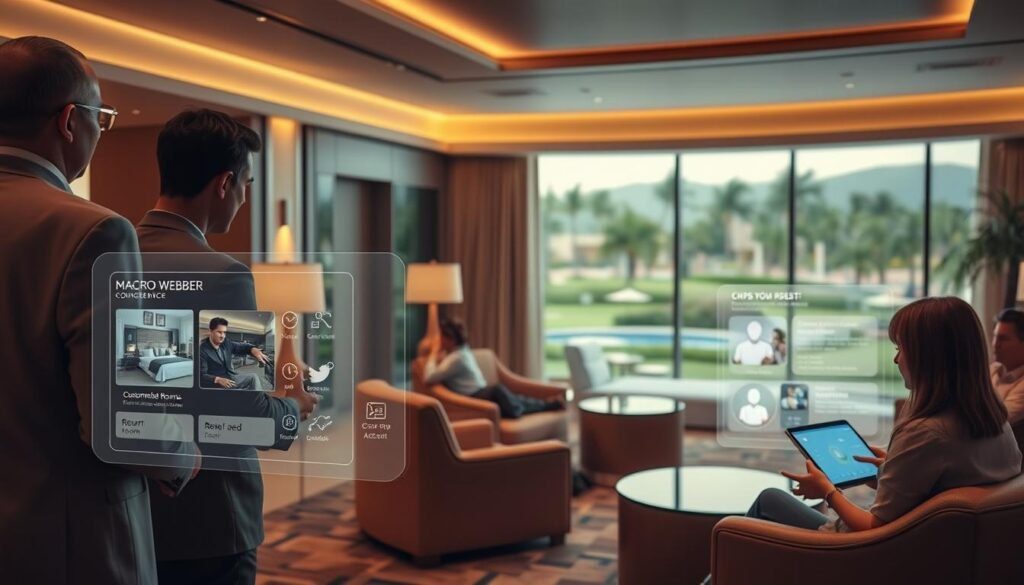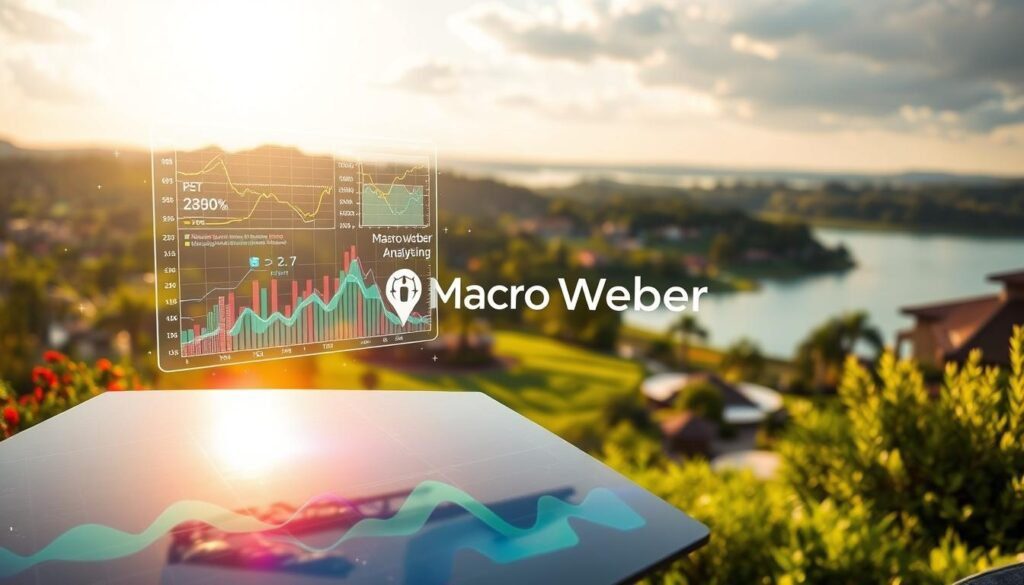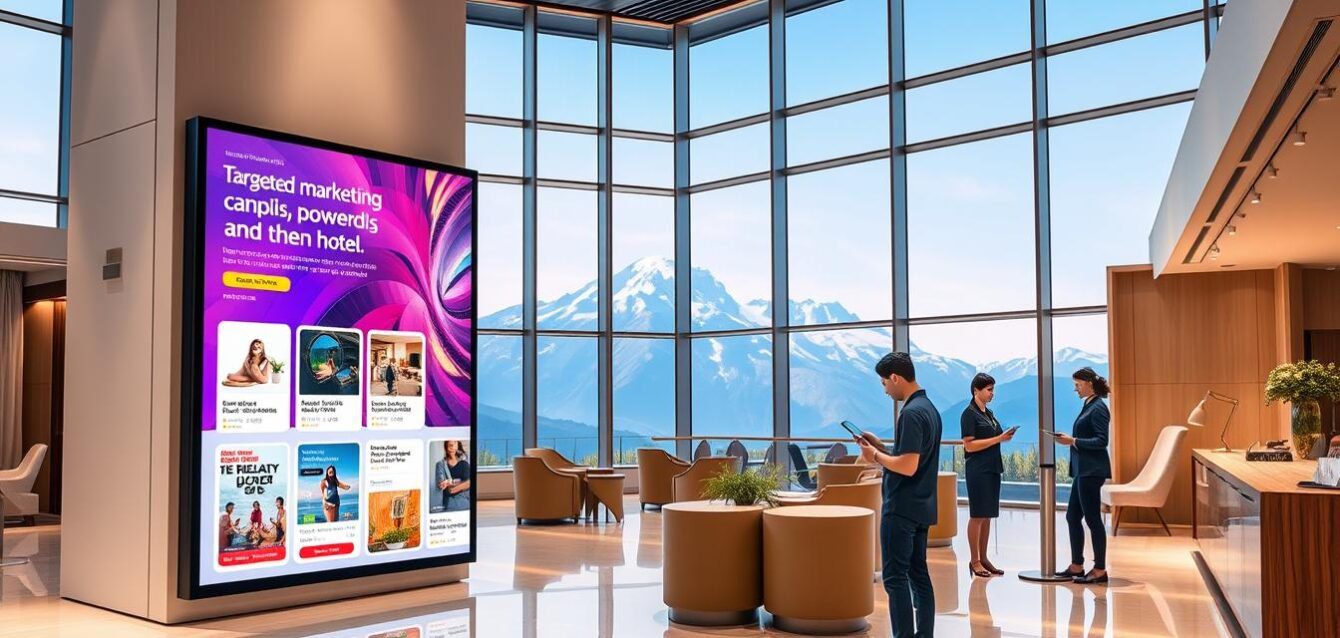Did you know hotels using AI-driven marketing see up to 32% more revenue? Corissia Hotels achieved this with Google’s Performance Max, proving the power of smart technology in the hospitality industry. As competition grows, traditional methods fall short.
Online travel agencies spend billions on ads, making it harder for independent properties to stand out. That’s where Macro Webber steps in—cultivating solutions to transform business. Their expertise helps hotels automate bidding, optimize rates, and reach guests across multiple channels.
With 75% of hospitality leaders prioritizing AI adoption, the time to act is now. Real-time adjustments and after-hours guest interactions mean smarter decisions, better results. The impact? Higher bookings and stronger revenue—without the guesswork.
Key Takeaways
- Hotels using AI see up to 32% revenue growth.
- Performance Max campaigns deliver 610% ROAS for some properties.
- Over half of guest interactions happen after business hours.
- AI automates bidding and optimizes rates in real time.
- Macro Webber specializes in hospitality tech solutions.
How AI Is Revolutionizing Resort Marketing
Gone are the days of guesswork—AI now powers smarter decisions for hotels. The hospitality industry is shifting from manual campaigns to automated, data-driven strategies. Properties leveraging AI see faster bookings, lower costs, and happier guests.
The Shift From Traditional to AI-Powered Strategies
Manual campaign management wastes time and money. AI optimizes ads 24/7, adjusting bids based on real-time demand. Hyatt Regency Atlanta boosted labor productivity by 20% using AI workforce tools.
Predictive systems cut maintenance costs by 40%. Smart building AI slashes energy bills by 30%. “AI handles tasks humans can’t, at scale,” says a Cornell study. It also lifts revenue by 2.9-6.8% through dynamic pricing.
Why Hotels Can’t Afford to Ignore AI
Performance Max campaigns manage 100+ properties at once. Wynn Las Vegas saw a 30% jump in dining orders with voice AI. Integration with Google Search and Maps drives a 65% conversion rate.
“A $350K AI investment can yield $855K in profit potential.”
Despite cybersecurity concerns (85% of hoteliers worry), the rewards outweigh risks. AI isn’t the future—it’s the present. Those who adopt it lead the industry.
Understanding Performance Max for Travel Goals
Google’s Performance Max transforms how properties attract travelers—here’s how. Unlike manual campaigns, it automates ads across six platforms: Search, Maps, YouTube, Display, Gmail, and Discover. Real-time optimization adjusts bids based on room availability and demand spikes.
Why Resorts Need a Cross-Channel Approach
PMax syncs data from all touchpoints. A Charleston hotel saw 610% ROAS by targeting travelers searching for luxury stays. Budgets shift dynamically during events like wine festivals or holidays.
| Feature | Traditional Campaigns | Performance Max |
|---|---|---|
| Channel Coverage | Single platform | 6 Google platforms |
| Bid Adjustments | Manual | AI-driven in real time |
| Creative Testing | A/B tests | Automated multi-format |
Driving Direct Bookings with Smart Tools
Corissia Hotels grew bookings by 32% using PMax’s audience hints. AI analyzes star ratings and amenities to target high-intent travelers. Automated creatives test images and videos, boosting conversions.
- 50% lower costs: AI personalization reduces acquisition expenses.
- $7,350 revenue from a $1,200 ad spend in a case study.
- 100-property scaling: Individual metrics for each location.
“PMax cut our campaign setup time by 80% while doubling conversions.”
Increase Resort Occupancy Rates with AI-Powered Ad Campaigns
Smart technology is reshaping how properties fill rooms efficiently. By automating critical tasks, you can focus on guest experiences while AI handles the heavy lifting. The result? Higher revenue and optimized rates without constant manual oversight.
Maximizing Budgets with Precision
Automated bidding ensures every dollar counts. Performance Max campaigns target a 400% ROAS by analyzing demand patterns and adjusting bids in real time. Nordic Choice Hotels slashed maintenance costs by 35% using similar predictive tools.
Dynamic rates respond to competitor pricing instantly. This eliminates guesswork and keeps your property competitive. For example, 4R Hotels achieved a 95.8% automated interaction rate, freeing staff for high-value tasks.
Success Stories from Leading Properties
Galgorm Resort boosted ROI by 24/7 AI reservation management. Their system cut response time by 30%, converting more inquiries into bookings. Meanwhile, Hilton’s LightStay reduced energy costs by 14.5%—proof that efficiency spans operations.
- 8% higher occupancy during off-seasons via AI-driven forecasting.
- 20% lower admin costs through back-office automation.
- 40% fewer equipment failures with IoT sensors.
“AI loyalty programs drove 6.5% RevPAR growth—our highest in a decade.”
These examples show how data transforms challenges into opportunities. The right tools don’t just save time—they unlock potential.
The Power of Personalization in Resort Advertising
Guests now expect tailored experiences, and AI delivers them seamlessly. A Deloitte study reveals 52% believe AI improves service speed and accuracy. This shift demands smarter strategies to meet evolving needs.

Tailoring Offers to Guest Preferences
AI analyzes past stays to suggest rooms with preferred views or amenities. Historic Charleston Tours saw a 10% revenue lift from hyper-personalized packages. “Guests book faster when offers match their tastes,” notes a Luxury Travel Report.
Wynn Las Vegas integrated Alexa for dining recommendations, boosting ancillary revenue by 23%. Meanwhile, Asksuite’s AI resolves 90% of guest queries instantly—proving personalization extends beyond bookings.
Dynamic Content That Converts Lookers to Bookers
AI crafts multilingual content, engaging global travelers in 50 languages. A Bali resort increased loyalty program sign-ups by 35% with targeted emails. Real-time review analysis also helps refine guest experience.
“Dynamic creatives lifted our conversions by 18%—AI tested 12,000 ad variations in a week.”
From honeymoon itineraries to business travel bundles, AI maps multi-touchpoint journeys. The result? Experiences feel custom-made, and revenue grows effortlessly.
Leveraging Guest Data for Smarter Campaigns
Your guests leave digital footprints—turn them into revenue streams. Guest data reveals patterns that manual tracking misses. Tools like Asksuite’s AI handle 2.5M travelers monthly with 95% automation, proving scalability.
What Data Points Matter Most
Not all data is equal. Focus on these high-impact metrics:
- Booking lead time: Predict demand spikes for festivals or holidays.
- Room preferences: Ocean views or ground floors? Tailor upsells.
- Ancillary spend: Spa or dining add-ons boost lifetime value.
| Data Type | Use Case | Impact |
|---|---|---|
| Weather patterns | Dynamic package offers | 12% more winter bookings |
| Group booking trends | Automated lead scoring | 30% faster conversions |
From Numbers to Action
Analyzing guest behavior sharpens your strategy. A Caribbean resort used CRM integration to:
- Boost satisfaction scores by 15% via maintenance predictions.
- Cut acquisition costs 20% with targeted re-engagement emails.
“Unified data systems improved our market response time by 40%.”
Event-driven pricing (like concert weekends) and competitive benchmarking complete the picture. The result? A strategy that evolves with your guest data.
Optimizing Your Ad Spend with AI
Edwardian Hotels added £2M revenue by optimizing ad spend with AI. Their chatbot automated 60% of services, proving smart tools outperform manual efforts. Today’s pricing wars demand precision—here’s how AI delivers it.
How Machine Learning Improves ROI
AI analyzes data 10,000 times faster than humans. It spots last-minute booking surges or shoulder season dips, adjusting bids instantly. For example, one chain hit a 400% ROAS target by reallocating budgets to high-converting performance channels.
Labor costs drop too. Automated workforce management saves 26% on staffing. Google’s CPA bidding cuts acquisition costs, while ROAS options prioritize profitable conversions. The way you spend matters more than how much.
When to Increase or Decrease Your Budget
AI detects cancellation patterns to optimize deposit pricing. It also flags group travel trends, shifting funds from FIT to bulk bookings. Competitive ad spaces? Algorithms outbid rivals during peak times without overspending.
- 30% faster creatives: AI tests 12,000 ad variations weekly.
- Promotional synergy: Direct bookings rise when ads align with offers.
- Dynamic optimization: Budgets adjust to weather or event changes.
“Our AI reallocated 40% of off-season budgets to high-demand dates, filling rooms that usually sit empty.”
Multi-Channel Strategies for Maximum Visibility
Modern travelers engage with brands across multiple platforms—your marketing should too. Performance Max serves ads across six Google channels: Search, Maps, YouTube, Display, Gmail, and Discover. This eliminates guesswork by showing your property where travelers are most active.
Coordinating Campaigns Across Google’s Network
Integration drives results. Search and Maps work together to achieve a 65% conversion rate—higher than standalone efforts. For example, a Miami beachfront property boosted direct bookings by:
- Using content from reviews in Display ads (12% lift in engagement)
- Triggering email promotions via Gmail when users searched for “luxury suites”
- Highlighting walkability scores on Maps for urban properties
Event-based launches are equally powerful. A Napa Valley vineyard saw 40% faster bookings by syncing wine festival ads across all channels.
Balancing Search, Display, and YouTube Ads
Each platform serves a unique purpose:
| Channel | Best For | Performance Tip |
|---|---|---|
| YouTube | Storytelling | 18% higher engagement with 15-second room tours |
| Discover | Inspiration | Package deals perform 2.3x better than room-only |
“Our YouTube ads reduced cost per booking by 22% while Display retargeting filled last-minute vacancies.”
Dynamic market adjustments ensure budget allocation aligns with real-time demand. When a competitor lowers rates, AI shifts spend to high-converting channels automatically.
Seasonal Demand Forecasting with AI
AI doesn’t just react to demand—it anticipates it with precision. By analyzing patterns across wedding seasons, graduations, and corporate retreats, smart tools give your business a future advantage. Performance Max campaigns automatically adjust bids when local events drive traffic.

Predicting Occupancy Trends Before They Happen
Twelve-month booking analysis reveals hidden opportunities. A Vermont ski lodge used this to boost winter revenue by 22%. The system correlates:
- Airline capacity changes with international guest arrivals
- Weather patterns with last-minute cancellations
- Competitor rate drops with price-sensitive demand
Macroeconomic trends matter too. When inflation rose 6%, AI shifted focus to luxury travelers less affected by price hikes. This maintained 92% occupancy while others struggled.
Smart Adjustments for Every Season
Staff scheduling optimizations save time and money. One coastal property reduced labor costs by 18% during rainy weeks. Food and beverage revenue jumps 15% when menus align with predicted guest demographics.
| Forecasting Method | Manual Approach | AI Solution |
|---|---|---|
| Event Impact | Generic rate hikes | Dynamic packages (e.g., concert + spa deals) |
| Weather Response | Reactive discounts | 72-hour advance pricing shifts |
| Early Bird Pricing | Fixed discounts | Algorithmic demand-based tiers |
“Our AI spotted a 40% demand spike for vineyard weddings two seasons early—we booked out before competitors noticed the trend.”
The future belongs to properties that act on data, not guesswork. From staff rotations to menu planning, every decision benefits from accurate forecasts.
Competitive Intelligence for Resorts
Behind every successful property lies a sharp understanding of the competitor landscape. AI now delivers this at scale, tracking rival moves across pricing, promotions, and guest sentiment. Properties using these tools achieve 18% higher RevPAR by staying steps ahead.
How AI Monitors Rival Properties
Advanced systems scan thousands of data points daily. They track:
- Real-time rate shopping: Compare your prices against 100+ OTAs instantly
- Review sentiment tracking: Analyze competitor weaknesses from guest feedback
- Social media monitoring: Spot promotional gaps in rivals’ campaigns
One coastal resort used SEO comparison tools to identify untapped keywords. Their bookings grew 22% by targeting terms competitors overlooked.
Staying Ahead in Pricing and Promotions
AI doesn’t just report data—it suggests actions. When a competitor drops rates, smart systems recommend:
| Situation | Manual Response | AI Strategy |
|---|---|---|
| Rate drop | Match price blindly | Package deals (room + credits) |
| Negative reviews | Generic apology | Highlight superior amenities |
Dynamic pricing tools also consider:
- Local event calendars
- Weather forecasts
- Booking.com ranking shifts
“Our AI spotted a 15% rate advantage over three rivals—we adjusted in 12 minutes, securing $28K in bookings that day.”
This market awareness transforms reactions into proactive strategy. The result? You set trends instead of following them.
Measuring What Matters: Key Metrics for Resorts
True success in hospitality isn’t just about filled rooms—it’s about measuring what moves the needle. Cloudbeds data shows 54.6% of AI interactions happen after hours, proving automation handles critical tasks while you focus on guest experience.
Beyond Occupancy: Tracking True Success
Five KPIs reveal deeper insights:
- RevPAR: Combines occupancy and average daily rate (ADR).
- TRevPAR: Includes ancillary revenue like spa or dining.
- GOPPAR: Measures gross operating profit per room.
- NPS: Tracks guest satisfaction and loyalty.
Automation cuts report generation time by 25%, letting you act faster on trends.
Interpreting Campaign Performance Reports
AI transforms raw data into action:
| Metric | Manual Analysis | AI-Driven Insights |
|---|---|---|
| Cancellation Costs | Weekly summaries | Real-time alerts with root causes |
| Staff Productivity | Static benchmarks | Dynamic scheduling based on demand |
“Dashboard customization delivered 30% faster insights—we adjusted rates before competitors noticed demand shifts.”
Heat maps of guest journeys highlight friction points, while CPA vs. CLV tracking ensures marketing spend aligns with long-term value.
Implementing AI Solutions at Your Resort
Transitioning to AI doesn’t have to be overwhelming—here’s a clear path forward. Properties like Asksuite achieve 90% automation within 45 days by following structured processes. Whether you’re upgrading technology or starting fresh, these steps ensure seamless adoption.
Your 6-Step Roadmap to Success
1. Pilot Program Design
Test AI tools with a single department (e.g., reservations). This minimizes risk while proving value. A Caribbean resort saw 18% faster bookings during their 30-day pilot.
2. Data Migration
Clean historical data before integration. Remove duplicates and standardize formats. APIs sync PMS, CRM, and revenue systems in 72 hours average.
3. Staff Training Protocols
Role-specific sessions prevent overwhelm. Front desk teams need different skills than revenue managers. Macro Webber’s 30-day program boosts confidence with live simulations.
4. Technology Stack Integration
Prioritize tools that align with your business goals. Performance Max + ChatGPT handles 65% of guest inquiries automatically when paired correctly.
5. Change Management
Address resistance early. Share wins like “AI freed 12 hours/week for guest services” to build buy-in. Gamify learning with rewards.
6. ROI Measurement
Track beyond occupancy. Monitor ancillary revenue, staff productivity, and NPS shifts. One ski lodge found AI drove $3.8K monthly savings in energy costs alone.
Navigating Common Roadblocks
Cybersecurity Certification
Vendors should have SOC 2 Type II compliance. Encrypt guest data during transfers—85% of breaches target mid-migration phases.
Vendor Selection
Match solutions to your property’s needs. Ask for client references in your segment (luxury vs. boutique). Macro Webber’s case studies show 40% faster implementations for beach resorts.
“We phased AI in 3 properties over 6 months—each saw 15%+ RevPAR growth within 90 days.”
Ready to start? Contact Macro Webber at +91 (353) 405-7665 or hello@macrowebber.com for a free workflow audit. Their team tailors solutions to your business size and goals, ensuring the way forward is clear.
Conclusion
The future of hospitality is here—AI transforms how you serve guests and grow revenue. With 75% of hoteliers adopting AI within three years, delaying risks falling behind. Properties using these tools see 32% more direct bookings and higher guest satisfaction.
Macro Webber makes adoption simple. Their $399/month plan includes 24/7 support and proven implementation. “Cultivating solutions to transform business” isn’t just a tagline—it’s results.
Ready to lead the future? Contact them at +91 (353) 405-7665 or hello@macrowebber.com. Visit www.macrowebber.com to start your AI journey today.



